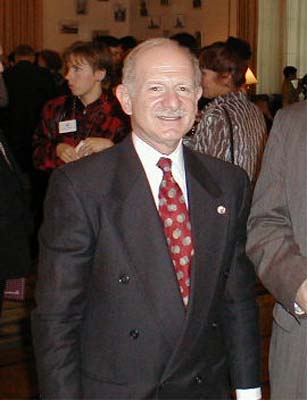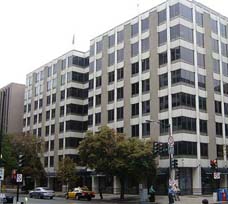2006.08.06: August 6, 2006: Headlines: Directors - Schneider: COS - Colombia: Boston Globe: Mark L. Schneider writes: A Complex Colombia
Peace Corps Online:
Directory:
Colombia:
Peace Corps Colombia :
The Peace Corps in Colombia:
2006.08.06: August 6, 2006: Headlines: Directors - Schneider: COS - Colombia: Boston Globe: Mark L. Schneider writes: A Complex Colombia
Mark L. Schneider writes: A Complex Colombia

"Without key policy changes, the higher expectations for Uribe's second term to end the conflict and strengthen democracy are likely to be frustrated. He needs to replace the one-note military strategy that characterized his first term with a broader peace, development, and defense strategy. It needs to emphasize rule of law, rural governance, and poverty reduction, and, without easing military pressure on the FARC, pursue a humanitarian accord and peace negotiations. Finally, Uribe needs to obey the constitutional court mandate to require paramilitary and guerrillas to reveal where their victims are buried and their ill-gotten assets hidden. Otherwise the Justice and Peace law will produce neither justice nor peace. The United States also needs to shift drastically the balance of military to economic aid, which now is 80 percent to 20 percent, to support a broader strategy to end impunity and end the conflict. It also is time for both presidents to rethink a flawed counternarcotics strategy and name independent commissions in both countries to ask fundamental questions about reducing supply there and demand here."
Mark L. Schneider writes: A Complex Colombia
A complex Colombia
By Mark L. Schneider | August 6, 2006
COLOMBIA'S PRESIDENT, Alvaro Uribe, will be inaugurated for his second term this week after his landslide reelection, yet the country's 40-year civil conflict still rages, secret police appear embroiled with paramilitary killers, and 90 percent of the cocaine consumed in the United States is produced there.
So why is Uribe President George W. Bush's favorite Latin American leader? The answer speaks to the complexity and contrasts of Colombia, a country twice the size of France with Amazon jungles, Caribbean and Pacific coastlines, and three parallel Andean mountain ranges that complicate governance and security. Colombia has democratic institutions. However, elites dominate economic and political power and have excluded the country's indigenous Afro-Colombian and rural poor. The top 10 percent of Colombians receive 61 percent of the nation's income compared to less than 1 percent for the bottom 10 percent of the population.
Uribe, a former mayor and governor whose father was assassinated by the leftist guerrilla group FARC (Revolutionary Armed Forces of Colombia), came to office with a pledge to stop FARC's rising power.
When I was in Bogotá four years ago, friends and diplomats warned me against making unnecessary trips, because the 17,000-strong FARC had made traveling on the country's highways a life-and-death gamble. The threat was punctuated by mortar attacks accompanying Uribe's inauguration. When I met with his vice president one day, a bomb exploded close enough to send us bouncing off our chairs.
However, each succeeding visit, including one just before Uribe's reelection, showed a lessening of Bogotá's siege mentality. With about 80 percent of US aid going to the military and police under the counter-drug/counterinsurgency Plan Colombia, Uribe made good on his promise to strengthen security. The guerrillas, now more intent on power than policy and showing little regard for human life as they seek to control cocaine profits, were forced deep into Colombia's hinterlands. Increased security also enabled Colombia's entrepreneurs, with the help of $10 billion in foreign direct investment last year, to reach 4 percent gross domestic product growth in consecutive years. Uribe's scheme to demobilize some 32,000 right-wing paramilitary members , many linked to the lucrative cocaine trade and to massive atrocities, helped the government reduce kidnappings, killings, and land occupations.
Those are the reasons Uribe won a first-round 62 percent victory. The reason that he is the White House favorite, though, is his counternarcotics cooperation and the extradition of more than 300 drug traffickers.
But the counternarcotics part of Plan Colombia is failing. Despite the rhetoric and $4.7 billion in US aid, 70 percent more coca was planted in 2005 than in 2000. Fields were sprayed and eradicated but more were planted. In 2005, about 356,000 acres of coca were harvested, identical to 2002, according to the White House Office of Drug Control. The office virtually admitted its disappointment with this year's cultivation numbers -- 26 percent higher than last year -- by releasing the data late on Good Friday -- not exactly prime time. Its explanation that the increase resulted from wider photographing sounded lame.
The counterinsurgency policy has clear weaknesses. It has not eliminated the FARC, whose forces stepped up attacks this year. About 5,400 kidnap victims of all armed groups are still unaccounted for. Extrajudicial executions rose last year and the State Department reported again that Colombian armed forces were guilty of human rights abuses. In June, army units were charged with killing 10 US-trained Colombian police to protect drug dealers.
The paramilitary demobilization is in crisis. Barely a handful of the thousands pardoned have reinserted into useful endeavors, and others have rearmed. The depth of the threat to democratic institutions is shown by reports that some recently elected national legislators as well as state and local officials were secretly financed by paramilitary groups. Top officials of the country's secret police are suspected of targeting labor leaders and human rights activists for the paramilitary hit-men.
Among the 2,180 paramilitary leaders being promised reduced sentences under Uribe's Justice and Peace Law, many have been indicted by the United States for drug trafficking. None have been required to disclose fully the crimes they committed, the location of people they kidnapped or killed, or the properties they stole from some of Colombia's more than 2 million displaced citizens. The country's constitutional court objected to Uribe's plan by altering a series of unconstitutional provisions in July to protect victims' rights.
Without key policy changes, the higher expectations for Uribe's second term to end the conflict and strengthen democracy are likely to be frustrated. He needs to replace the one-note military strategy that characterized his first term with a broader peace, development, and defense strategy. It needs to emphasize rule of law, rural governance, and poverty reduction, and, without easing military pressure on the FARC, pursue a humanitarian accord and peace negotiations. Finally, Uribe needs to obey the constitutional court mandate to require paramilitary and guerrillas to reveal where their victims are buried and their ill-gotten assets hidden. Otherwise the Justice and Peace law will produce neither justice nor peace.
The United States also needs to shift drastically the balance of military to economic aid, which now is 80 percent to 20 percent, to support a broader strategy to end impunity and end the conflict. It also is time for both presidents to rethink a flawed counternarcotics strategy and name independent commissions in both countries to ask fundamental questions about reducing supply there and demand here.
Mark L. Schneider, former director of the Peace Corps, is senior vice president of the International Crisis Group, an international conflict prevention organization.
© Copyright 2006 Globe Newspaper Company.
When this story was posted in August 2006, this was on the front page of PCOL:





Peace Corps Online The Independent News Forum serving Returned Peace Corps Volunteers
 | Peace Corps' Screening and Medical Clearance
The purpose of Peace Corps' screening and medical clearance process is to ensure safe accommodation for applicants and minimize undue risk exposure for volunteers to allow PCVS to complete their service without compromising their entry health status. To further these goals, PCOL has obtained a copy of the Peace Corps Screening Guidelines Manual through the Freedom of Information Act (FOIA) and has posted it in the "Peace Corps Library." Applicants and Medical Professionals (especially those who have already served as volunteers) are urged to review the guidelines and leave their comments and suggestions. Then read the story of one RPCV's journey through medical screening and his suggestions for changes to the process. |
 | Gates charity races to spend billions
Warren E. Buffett’s gift of $31 billion to the Bill and Melinda Gates Foundation means that for tax reasons, starting in 2009, the foundation must distribute $3 billion annually, or a little more than twice what it distributed last year.
PCOL Comment: The Foundation says that "preventing the spread of HIV is the most durable long-term solution to the AIDS epidemic, and a top priority for the foundation." Peace Corps Volunteers and Returned Volunteers have been doing just that in AIDS Education for the past 15 years. Why not consider a $100M annual contribution to the Peace Corps to put 2,500 additional volunteers in the field to expand AIDS education worldwide? |
 | The Peace Corps is "fashionable" again
The LA Times says that "the Peace Corps is booming again and "It's hard to know exactly what's behind the resurgence." PCOL Comment: Since the founding of the Peace Corps 45 years ago, Americans have answered Kennedy's call: "Ask not what your country can do for you--ask what you can do for your country. My fellow citizens of the world: ask not what America will do for you, but what together we can do for the freedom of man." Over 182,000 have served. Another 200,000 have applied and been unable to serve because of lack of Congressional funding. The Peace Corps has never gone out of fashion. It's Congress that hasn't been keeping pace. |
 | Changing the Face of Hunger
In his new book, Former Congressman Tony Hall (RPCV Thailand) says humanitarian aid is the most potent weapon the United States can deploy against terrorism. An evangelical Christian, he is a big believer in faith-based organizations in the fight against hunger. Members of Congress have recently recommended that Hall be appointed special envoy to Sudan to focus on ending the genocide in Darfur. |
 | PC will not return to East Timor in 2006
Volunteers serving in East Timor have safely left the country as a result of the recent civil unrest and government instability. Latest: The Peace Corps has informed us that at this time, the Peace Corps has no plans to re-enter the country in 2006. The Peace Corps recently sent a letter offering eligible volunteers the opportunity to reinstate their service in another country. |
 | Chris Dodd considers run for the White House
Senator Chris Dodd plans to spend the next six to eight months raising money and reaching out to Democrats around the country to gauge his viability as a candidate. Just how far Dodd can go depends largely on his ability to reach Democrats looking for an alternative to Hillary Clinton. PCOL Comment: Dodd served as a Volunteer in the Dominican Republic and has been one of the strongest supporters of the Peace Corps in Congress. |
 | Vasquez testifies before Senate Committee
Director Vasquez testifies before the Senate Foreign Relations Committee on his nomination as the new Representative to the United Nations Agencies for Food and Agriculture replacing Tony Hall. He has been the third longest serving Peace Corps Director after Loret Ruppe Miller and Sargent Shriver. PCOL Comment: Read our thanks to Director Vasquez for his service to the Peace Corps. |
 | Peace Corps stonewalls on FOIA request
The Ashland Daily Tidings reports that Peace Corps has blocked their request for information on the Volkart case. "After the Tidings requested information pertaining to why Volkart was denied the position — on March 2 — the newspaper received a letter from the Peace Corps FOIA officer stating the requested information was protected under an exemption of the act." The Dayton Daily News had similar problems with FOIA requests for their award winning series on Volunteer Safety and Security. |
 | PCOL readership increases 100%
Monthly readership on "Peace Corps Online" has increased in the past twelve months to 350,000 visitors - over eleven thousand every day - a 100% increase since this time last year. Thanks again, RPCVs and Friends of the Peace Corps, for making PCOL your source of information for the Peace Corps community. And thanks for supporting the Peace Corps Library and History of the Peace Corps. Stay tuned, the best is yet to come. |
 | History of the Peace Corps
PCOL is proud to announce that Phase One of the "History of the Peace Corps" is now available online. This installment includes over 5,000 pages of primary source documents from the archives of the Peace Corps including every issue of "Peace Corps News," "Peace Corps Times," "Peace Corps Volunteer," "Action Update," and every annual report of the Peace Corps to Congress since 1961. "Ask Not" is an ongoing project. Read how you can help. |
 | RPCV admits to abuse while in Peace Corps
Timothy Ronald Obert has pleaded guilty to sexually abusing a minor in Costa Rica while serving there as a Peace Corps volunteer. "The Peace Corps has a zero tolerance policy for misconduct that violates the law or standards of conduct established by the Peace Corps," said Peace Corps Director Gaddi H. Vasquez. Could inadequate screening have been partly to blame? Mr. Obert's resume, which he had submitted to the Peace Corps in support of his application to become a Peace Corps Volunteer, showed that he had repeatedly sought and obtained positions working with underprivileged children. Read what RPCVs have to say about this case. |
 | Why blurring the lines puts PCVs in danger
When the National Call to Service legislation was amended to include Peace Corps in December of 2002, this country had not yet invaded Iraq and was not in prolonged military engagement in the Middle East, as it is now. Read the story of how one volunteer spent three years in captivity from 1976 to 1980 as the hostage of a insurrection group in Colombia in Joanne Marie Roll's op-ed on why this legislation may put soldier/PCVs in the same kind of danger. Latest: Read the ongoing dialog on the subject. |
Read the stories and leave your comments.

Some postings on Peace Corps Online are provided to the individual members of this group without permission of the copyright owner for the non-profit purposes of criticism, comment, education, scholarship, and research under the "Fair Use" provisions of U.S. Government copyright laws and they may not be distributed further without permission of the copyright owner. Peace Corps Online does not vouch for the accuracy of the content of the postings, which is the sole responsibility of the copyright holder.
Story Source: Boston Globe
This story has been posted in the following forums: : Headlines; Directors - Schneider; COS - Colombia
PCOL33982
55

























